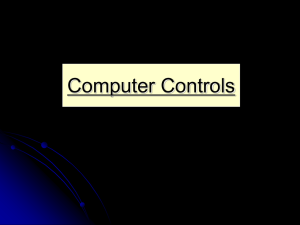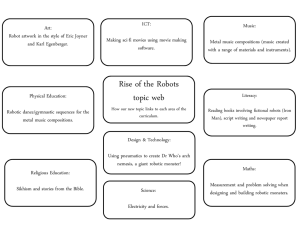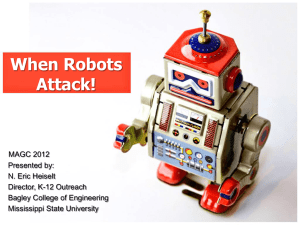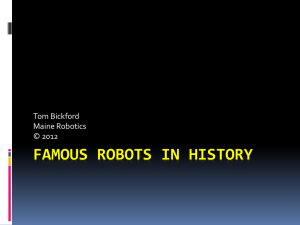ADVANCED EXPERT PANEL on „Future Trends in Knowledge
advertisement
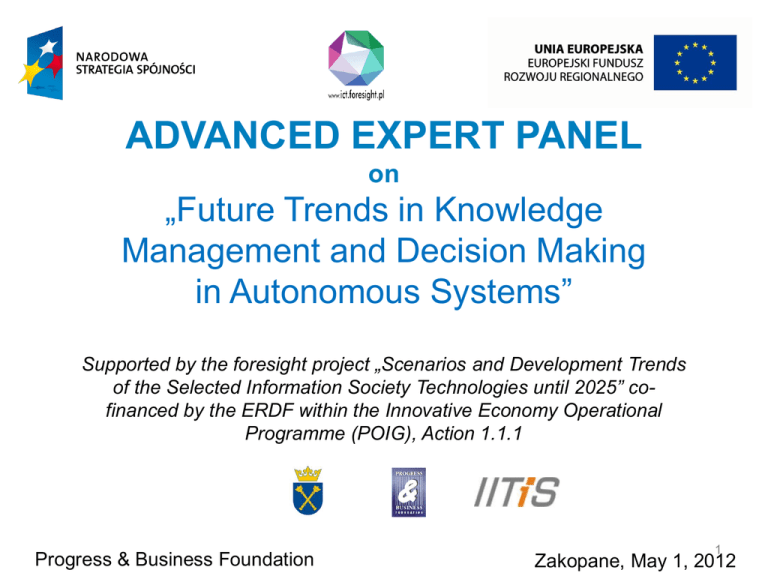
ADVANCED EXPERT PANEL on „Future Trends in Knowledge Management and Decision Making in Autonomous Systems” Supported by the foresight project „Scenarios and Development Trends of the Selected Information Society Technologies until 2025” cofinanced by the ERDF within the Innovative Economy Operational Programme (POIG), Action 1.1.1 Progress & Business Foundation 1 Zakopane, May 1, 2012 PANELISTS: Prof. Włodzisław Duch, Toruń University Prof. Janusz Kacprzyk, Systems Research Institute, Warsaw Prof. Ignacy Kaliszewski, Systems Research Institute, Warsaw Prof. Antoni Ligęza, AGH University, Kraków Prof. Kaisa Miettinen, University of Jyvaskyla Prof. Andrzej M. Skulimowski (moderator), ICDSF & AGH University, Kraków … (tbc) 2 ICAISC Zakopane, May 1, 2012 Highlights: • The discussion will be preceded by a short presentation of the foresight project methodology and its results achieved so far (5-10 minutes) • About ten hot topics from within the scope of the Panel will be discussed by the Panelists, with contributions from the Audience (5-8 minutes each) • It will follow a short general discussion (10-15 minutes) on the future of AI • After the Panel: all participants will be invited to an expert Delphi related to the topics of the Panel 3 ICAISC Zakopane, May 1, 2012 1. Decision Support Prospects until 2025 • Progress in structuring human decisions until 2025: - new kind of theoretical models? - better understanding of neural decision mechanisms (mirror neurons and…?) - non-stationarity of human preferences - coping with inconsistency and irrationality • Cognitive MCDM? • DSS in the cloud, mobile DSS, recommenders - Electronic Personal Preference Record (EPR)? - Privacy protection issues - Fusion of all one’s preference information gathered by different web agents • MCDM-based intelligent recommenders • New DSS architectures? 4 ICAISC Zakopane, May 1, 2012 2. Future Applications of Direct Brain Interfaces (Direct BCI, D-BCI) in Decision Support Systems (DSS) • D-BCI and ‚Internet of Brains’ • The role of enhanced reality in decision making • Virtual realities created with D-BCI and simulation of consequences of decisions made • What kind of decisions may be supported using BCI? a) D-BCI for operational decisions (eg. control of complex industrial and transport systems) b) Military DSS with D-BCI c) Supporting everydays’ decision making (direct interface • Time perspective: 2020?, 2025?, 2030? 5 ICAISC Zakopane, May 1, 2012 3. Application prospects of external (no implants) BCI and Physiological Human Computer Interfaces (PHCI) • Applications of BCI to man-machine communication • Applications of BCI in virtual reality and games (trends?, market estimations?) • Thought recognition by external BCI (technological trends?, privacy challenges?, other threats?) • Reading, recording, and recognition of short-term human memory – applications in elderly amnesia • Reading, recording, and recognition of long-term human memory – applications in therapy of post traumatic stress disorder symptoms, such as amnesia • Novel PHCI technologies and mechanisms (recognition of mimics, eye and eyelid movements, skin thermal potentials etc.) • Applications in mobile DSS 6 ICAISC Zakopane, May 1, 2012 4. Common application of autonomic mobile robots (AMR) • Main functionalities of autonomous mobile robots • Research robots • Personal robotic companions vs. intelligent buildings • Industrial applications of autonomous mobile robots • Main technical problems (hardware and lower-level software such as hardware drivers and communication software) • Main issues releted to the intelligent decision software development • Cellular mobile robots (standard simple robots capable of creating ad hoc specialized complex organisms) 7 ICAISC Zakopane, May 1, 2012 5. Autonomous flying robots (UAV) • UAV prospects until 2025: - no more manned combat aircraft? - first unmanned passenger aircraft • Space robots • UAV swarms • Progress in robot vision and other sensory perception mechanisms for UAV (cognitive radar etc.) • Autonomous robots, but to which extent? 8 ICAISC Zakopane, May 1, 2012 6. Worldwide monitoring systems • Automatic recognition of dangerous situations • A new direction of development: Citizens’ monitoring? (decentralized monitoring systems serving a community that manages them) • Global CBIR (on the web, from different ground- and air-based monitoring systems) • Global satellite-based monitoring systems • Integration of monitoring systems • Privacy issues 9 ICAISC Zakopane, May 1, 2012 7. Merging knowledge acquisition, vision and rule based systems • Trends in rule-based image understanding • The emergence of tailored knowledge bases to facilitate image analysis and understanding • Automatic medical image understanding systems (CT, USG, NMR, PET etc.) • Remote patient monitoring and multidimensional data fusion • Merging all kinds of medical information: data management and privacy protection issues • New developments in uncertainty management • Trends in rule-based diagnostic systems: technologies, tera-rule databases, applications 10 ICAISC Zakopane, May 1, 2012 8. Hot topics in machine intelligence and neurocognitive systems • Machine consciousness and machine anticipatory capabilities • How to manage the decision freedom in autonomous systems? • Machine creativity and imagination • Preference transfer problem (how to transfer and update one’s preferences to an AADS efficiently and reliably? ) • Hierarchy of goals and conflicts of interests between AADS. How to solve them? • Robotic societies and co-evolution 11 ICAISC Zakopane, May 1, 2012 9. Towards a human- or machine-intelligencecentered civilization? • HCT (= human centered technologies) development prospects • How humans will be changed by technology confluence of humans and computers (in a bit broader sense than BCI) • Will the virtual realities develop towards a Matrix – will the computer addicts facilitate this process? • Will we need a robotic revolt or a web rebellion? 12 ICAISC Zakopane, May 1, 2012 10.Disruptive technologies, wild cards, uncertainties • Examples of unexpected technological trend changes from the past • Low-probability high-impact scientific discoveries: …. • Low- to medium-probability biological, economic and social phenomena • Medium- to high-probability disruptive political and natural events (natural and anthropogenic disasters) 13 ICAISC Zakopane, May 1, 2012 Thank you for your participation! Everybody is invited - To take part in the Delphi research on this panel’s topics The questionnaires and more info can be found at: http://www.ict.foresight.pl/user/index.php?module=delphi - To take part at the Final Conference (no registration fee) to be held in Kraków on October 26, 2012 14 ICAISC Zakopane, May 1, 2012
